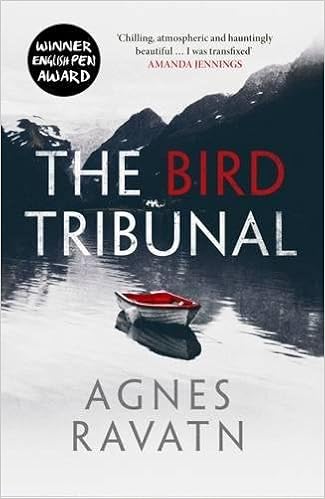Allis
Hagtorn takes a job as a live-in cook and gardener for Sigurd Bagge. Wanting to escape her life which involved
some type of public scandal, she is happy to retreat to an isolated house (“liberated
from the watchful gaze of others, free from their idle chit-chat”) where she
has virtually no interaction with anyone other than her employer. And initially, there is even very little
communication with him; he is a taciturn man who barely acknowledges her
existence. Slowly, however, an awkward
relationship develops between them, but though they make revelations, both keep
secrets. The mysteries surrounding her
boss fascinate Allis but they also leave her discomfited.
There is a
mounting, pervasive sense of dread throughout.
Allis is largely cut off from the world; other than Sigurd, she speaks only
to a surly shopkeeper who makes cryptic and sneering comments that unsettle
Allis. Sigurd’s wife is away but no
explanation is given for her extended absence.
There’s a locked room. And there’s
the brooding, mercurial Sigurd whose abrupt mood swings create a sense of
danger. Even nature (a silent forest, dead
grass and shrubbery, malevolent gulls, invading mice, a sky the colour of blood)
seems menacing.
The two
characters are complex. Sigurd is obviously
enigmatic and volatile, but he also seems manipulative. He pulls Allis closer by engaging her in
conversation but then pushes her away, as if trying to keep her confused and
unsettled: “His expression . . . always
scrutinizing, as if to demonstrate that I was his, that he could decide where I
could and couldn’t go.” And some of his
behaviour and statements can easily be interpreted as threatening: “There’s no guarantee of anything” and “She
won’t be troubling you anymore.” Why
does he say that there were “quite a few” responses to his job posting and
later suggest Allis was the only applicant?
Though Allis becomes obsessed with him, there is little that makes
Sigurd an attractive person.
Allis,
however, is also not an admirable person.
She describes herself as some who “always started with the same
unbridled enthusiasm before swiftly giving up.
I possessed no sense of perseverance, no will to accomplish anything in
full.” She believes she has something
within her “that prevented me from being faithful.” She mentions, “my irrational pride prevented
me from ever taking the initiative when it came to reconciliation, ever.” When she learns that a man is a manual
labourer, his lower status matters to her; she even admits her shallowness: “Did he realize just how superficial I was?” She acknowledges that she was “willing to
reduce to rubble” the life of someone “who had never been anything but good to
me.” Like Sigurd, she also seems
manipulative. She is desperate for male
attention and does what she can to entice Sigurd. Furthermore, she sees the job as a chance at
a new life; she wants to transform herself:
“There was salvation to be found, I could create a sense of self, mould
a congruous identity in which none of the old parts of me could be found.” She is not beyond using the situation for her
own ulterior motives.
Allis is the
narrator but she is hardly reliable. She
claims that Sigurd doesn’t make eye contact:
“He didn’t look me in the eye but instead stared past me” and “He didn’t
seem particularly bothered about making eye contact with me as he spoke.” Later, however, he says to her, “You’ve
never looked me in the eye. . . . You don’t look me in the eye, you just gaze
straight past me.” So who doesn’t make
eye contact? Is Sigurd strange or is
she? At one point, Sigurd says, “If I
were as strange as you are . . . You’re not normal.” Then there’s the discussion about swimming. Early on, Allis insists, “I can swim” but on
two other occasions, she repeats, “I don’t swim.”
Then there
are some thoughts that she mentions that are downright strange: “I could play any role, it was my greatest
talent” and “Did [Sigurd’s wife] have to come back? She did, of course. But no, she couldn’t” and “As long as I
thought of her as no more than a shopkeeper – not as an individual, but as part
of some vague, hostile force – then it would be easier to kill her, I thought”
and “[mundane tasks] anchor the stream of thoughts that otherwise drifted so
easily to darker places.”
I enjoyed
the references to Norse mythology which unify the novel and clarify the ending. When Allis first meets Sigurd, she is
reminded of Balder, but it seems she sees herself as this Norse god who “brings
about the destruction of the world, but that allows for a newer, better world
to emerge.” She seems to see Sigurd as
Loki “who has no one” and she says, like Loki’s wife, she would help Sigurd
atone if he were somehow being punished.
In a third discussion of the legend, she mentions that “Old guilt is
destroyed by fire and swallowed by the sea. . . . Perhaps . . . guilt requires
atonement, perhaps it needs to be wiped out if a new world is to emerge.” It is not coincidental that the phrase “corpses
nestled among its feathers” is repeated at the end with its implication that “Maybe
. . . even in the new world there is potential for evil.” (And surely it is not by chance that a dress
of “shimmering, blue-green material almost the colour of a mallard’s head” fits
Allis perfectly and reminds the reader of Sigurd’s dream of a tribunal which
featured a woman with a mallard’s head of “astonishingly beautiful shimmering
green”?)
This is not
your average run-of-the-mill psychological thriller. Its layers actually invite a second
reading.

No comments:
Post a Comment